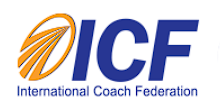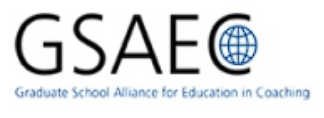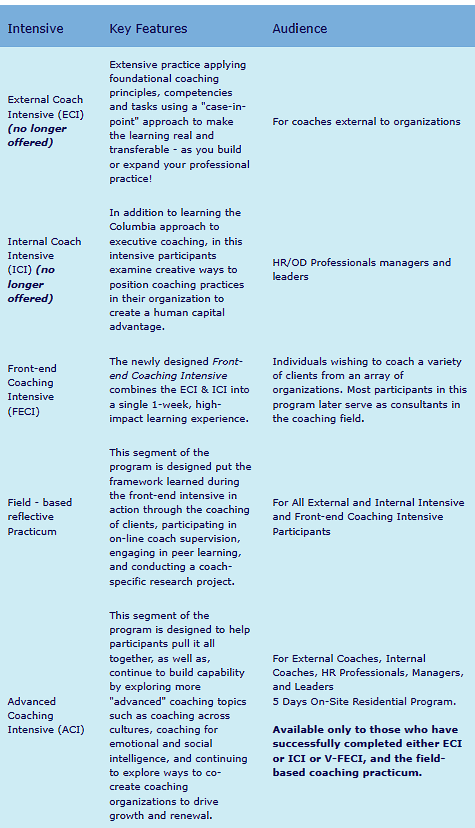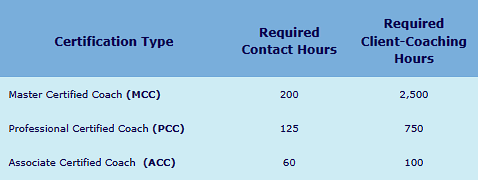Frequently Asked Questions
Have more questions about: Columbia’s Coaching Program, use the links below to learn about the benefit our certification; definitions of coaching; the program’s structure; and Columbia University’s Coaching Center of Excellence? Click the related link below for more information.
A World-renowned Faculty at a Research University, in a World-class City!
Two top ranked schools at Columbia University join forces to offer a Coaching Certification Program and Center for Coaching Excellence. This collaboration is a natural extension of a long and productive relationship between Columbia's Executive Education Division, Columbia Business School and The Center for Educational Outreach and Innovation, Teachers College.
Teachers College, Columbia's Graduate School of Education
The home of top graduate programs in:
- Adult Learning and Leadership
- Social and Organizational Psychology
- Counseling Psychology
The Columbia Business School, Executive Education 
- Global Presence in a Global World
- Global Presence in a Global World
The Columbia Coaching Certification Program will position you to communicate a strong value proposition to clients and to provide you with a solid foundation needed to operate effectively in this exciting and growing field of professional practice!
Market Demand
In the U.S. alone, spending levels associated with coaching were estimated to increase from 1 billion1 in 2004 to 2.4 billion2 in 2006, and is projected to grow 18 percent annually. Coaching is one of the fastest-growing areas of leadership development, yet this emerging field is extremely fragmented, with few barriers to entry. Positive returns on coaching investments rely on the ability of coaches to link their work to business strategy and development.
Notes:
- Harvard Business Review, December 2005
- MarketDataInc. 2006
Added Benefit - Earn a Columbia Executive Education Certificate in Business Excellence
Coaching Certification Program participants are encouraged to combine their coaching certification with additional courses offered by the CBS's Executive Education Diversity resulting in a Certificate in Business Excellence which grants Columbia Business School Alumni status (go to https://execed.business.columbia.edu/ for more information)
The Columbia Coaching Certification Program Draws on Definitions from Two Premier Organizations to Inform Our Thinking Related to the Meaning of Coaching…

Definition... "Coaching is partnering with clients in a thought-provoking and creative process that inspires them to maximize their personal and professional potential."
Role... "Professional coaches provide an ongoing partnership designed to help clients produce fulfilling results in their personal and professional lives. Coaches help people improve their performances and enhance the quality of their lives."
Preparation and Core Beliefs..."Coaches are trained to listen, to observe and to customize their approach to individual client needs. They seek to elicit solutions and strategies from the client; they believe the client is naturally creative and resourceful. The coach's job is to provide support to enhance the skills, resources, and creativity that the client already has."

Executive & Organizational Coaching
A Working Definition: ...A development process that builds a leader’s capabilities to achieve professional and organizational goals.
The focus is on leaders who are in a position to make a significant contribution to the mission and purpose of their organization.
This form of coaching is conducted through one-on-one and group interactions; is driven by evidence, the inclusion of data from multiple perspectives, and is built on a solid foundation of mutual trust and respect.
The coach, the clients, and their organizations work in partnership to help achieve the agreed upon goals of the coaching engagement.
Our Comprehensive Approach to Coaching is Based on Three Foundations Used to Navigate the Work:

Over a period of eight to ten months, program participants will navigate a path towards mastery of the Coaching Foundations. Participants begin by developing a solid understanding of four guiding principles found to differentiate highly effective coaches, the High Impact Coaching Process, and intensive practice with nine core coaching competencies. The primary aim of our three component certification process is to help participants chart their path towards an individualized coaching approach. These building blocks provide coaches and their clients with a solid platform for co-creating the unique paths needed to achieve the results they truly desire.
All participants will attend the Front-end Coaching Intensive, dependent upon their coaching context. Following the 5-day intensive they will transition into a six-month Reflective Practicum and finish by joining together for the Advanced Coaching Intensive. Upon completion, participants will be fitted with the skills to begin the next phase of their journey -- The practice of Professional Coaching.
Columbia Program's Alignment with ICF and other Professional Associations
In launching the program, the program has aligned its coaching approach to 11 core competencies as defined by The International Coach Federation, founded in 1992 and currently the leading global organization in terms of size of membership and number of chapters worldwide. ICF is dedicated to advancing the coaching profession by setting high standards, providing independent certification, and building a worldwide network of credentialed coaches. [NOTE: The Columbia Program's design, implementation and annual progress reviews, have also been informed by the Graduate School Alliance for Executive Coaching's (GSAEC) academic standards. As a leading, Research-I University the combination of aligning our work with both a leading coaching professional association and GSAEC meets our unique requirements of being housed in two leading academic departments of Columbia University.]
ICF and the Columbia Program:
ICF currently offers three levels of certification, attainable through the following contact and client coaching requirement:

Columbia University offers various credentials that are recognized and well respected around the world, credentials include academic program degrees, certificate program, and intensive professional certification processes (the later two are generally offered via CEUs). Our non-degree credit and credit programs are accredited by the International Association for Continuing Education and Training (IACET), with IACET accreditation, a CE/T provider tells the world it is committed to best practices in adult learning and that it has successfully mastered IACET's rigorous Authorized Provider Accreditation process. Specifically related to ICF, Columbia Program participants wishing to attain ICF certification must apply using their portfolio application at the ACC or PCC levels depending on the number of client hours logged and performance on ICF oral exam, where the contact hours earned at Columbia can be applied toward meeting the "coach-specific training" requirement. At the present time, Columbia University will NOT seek program accreditation from the ICF for the following reasons:
1. As a accredited Research-I university, our university-wide accreditation requires that all programs seek accreditation from recognized by the International Network for Quality Assurance Agencies in Higher Education (INQAAHE), or other organizations that monitor the quality of accrediting bodies;
2. At the present time, ICF as self governing organization, does not belong to an oversight body to ensure the rigor, validity and quality of its accreditation procedures; and
3. All accredited programs at Columbia University must be recognized by organizations who adhere to the generally accepted professional standard that the independent "certification agency must not also be responsible for the accreditation of educational or training programs or courses of study leading to certification" (2003 Report, Standards for Accreditation of Certification Programs, prepared by the National Commission for Certifying Agencies). For more information on credentialing in the coach training and education space, we recommend reviewing the following website:
www.peer.ca/credentials05.html
Via Columbia's membership with GSAEC, our leaders on in conversation with ICF and other professional coach associations to address this important accreditation requirement for university based program. The Columbia Program's five year plan calls for seeking accreditation from other organizations, as they meet rigorous accreditation quality assurance and governance requirements, such as:
- Worldwide Association of Business Coaches (WABC)
- Society of Human Resource Management (SHRM)
- APA -- Division 14: Society of Industrial and Organizational Psychology
- International Association of Coaching (IAC)
- Center for Credentialing and Education (CCE)
We continue to search for opportunities to align ourselves with professional associations, service organizations, support networks, and consortiums that share a commitment to becoming a global resource for high quality executive education opportunities for aspiring and existing coaching professionals.
Co-Creating an Emerging Field of Practice
The Columbia Coaching Certification Program is one aspect of our larger commitment to enhancing human potential and organizational performance through coaching. Achieving mastery of the fundamental coaching skills is a life time journey and we see the certification program as a stop along the way.
The Center for Coaching Excellence exists to create value to individuals, groups and organizations interested in the on-going enhancement of knowledge about the process of coaching and related skills. The Center provides multiple spaces and opportunities for learning, development and renewal.
The Center will leverage the power of imagination and co-creation by sponsoring conferences, conducting and disseminating research, developing e-learning modules and offering collaborative e-forums for networks of coaches to stay connected.